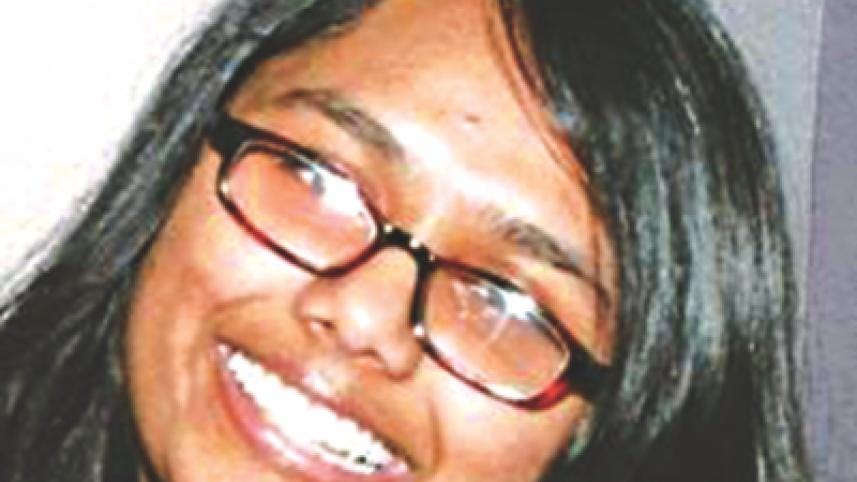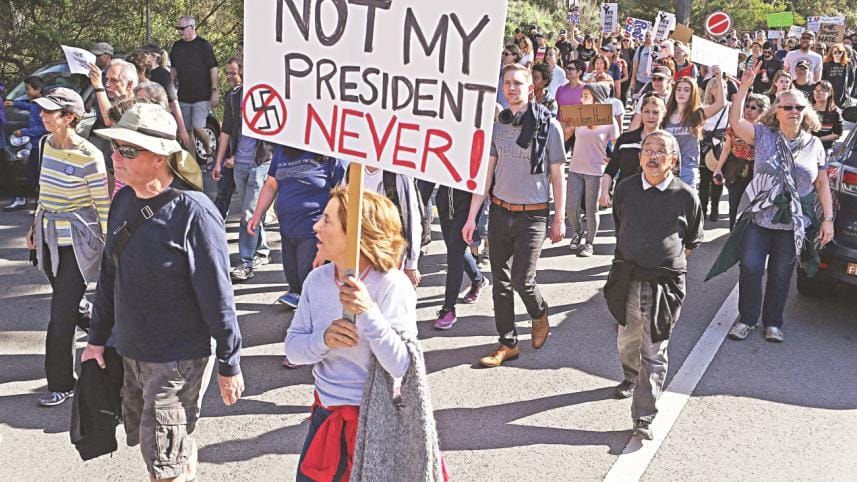Anti-Trump protests rock US cities

After Donald Trump's surprising win on Election night, thousands of Americans took to the streets and protested his election. Anti-Trump protests have taken place for four continuous days in major cities in the United States such as Los Angeles, New York City, Washington D.C., Orlando, and Portland. All over the country people are seen marching on highways and streets, chanting "love trumps hate" and holding signs that say "Not my president".
Ruby, a Bangladeshi New Yorker working for the city council of the state, attended the Anti-Trump protests in Columbus Circle on Wednesday evening, a day after Trumps election.
"It was pretty large. There were different groups protesting different thing so I'm thinking there was a couple of thousand people" she said when describing the sheer size of the protest.
She then went on to explain her reason for joining the thousands of citizens that day. "Initially I went there because when I finished work, I had all these waves of emotion and disgust about the future. We were going through a mourning period at work and once I got there, it was comforting knowing I wasn't grieving alone."
The 27-year-old sounded frustrated while saying, "I hugged a stranger and cried with them because half our country gave us the middle finger."
On Saturday afternoon, New Yorkers assembled at the Union Square park at 14th Street to protest the president elect for the fourth consecutive day.

People were eager to march over to the Trump Tower on 5th avenue and began chanting "march, march, march" before the group was set to move.
A carpenter and ANSWER Coalition volunteer, Carlos, went in and around the marching crowd signing people up to participate in an anti-Trump protest in Washington D.C. and become volunteers of the organisation.
This was his third protest he attended in the week and when asked why he came he responded "I'm Brazilian. I was the first person in my family to be born in the United States. Last month I had a woman stay in my apartment in a spare bedroom. She had just arrived [in the United States] and she was looking for a place to live for work so I helped her out. But now that Trump is president I don't even know what is going to happen even to her, she hasn't even been here for three months. I'm here because I think we have to unite and we have to get organised."
Carlos seemed hopeful about people coming together and voicing their anger and being politically active. "I think it's going to go on for a while, even if it dies down for a little bit. Protests and movements in general, they rise and they slow down for a little bit. You can see it in Black Lives Matter and we saw it with Occupy but these people aren't going to disappear.
Once Trump starts initiating his attacks, once he cuts social security, once he reduces the tax bracket, once he deports immigrants, people are going to become more revolted and they are going to want to do something. So, this is just the beginning. This is just saying we're here, we're willing to fight back."
Among the protesters, Dorcas, a designer, chanted for Trump to leave with a fierce gaze and powerful, unwavering voice. This was her first anti Trump protest she was attending with her friends.
"We are against the policies that Trump is implementing -- racism, global warming, abuse against women, and abuse against the Gay and Lesbian communities," she yelled, her voice straining over the loud chants.
Her friend explained why she was attending saying, "We don't want a misogynist as the president of the United States.
Like Carlos, Dorcas also wanted the protests to continue. "I hope people don't give up fighting for their rights," she concluded before marching off with her friends.
Marginalised groups are coming together in an effort to protect their communities and themselves. Trump's election has caused major uproar among the American public and it is not clear when protests will end.



 For all latest news, follow The Daily Star's Google News channel.
For all latest news, follow The Daily Star's Google News channel.
Comments